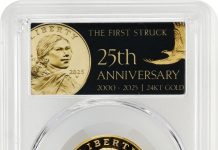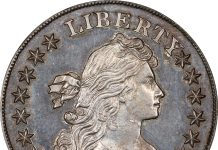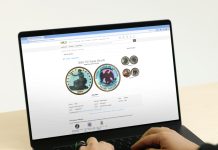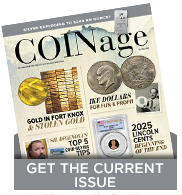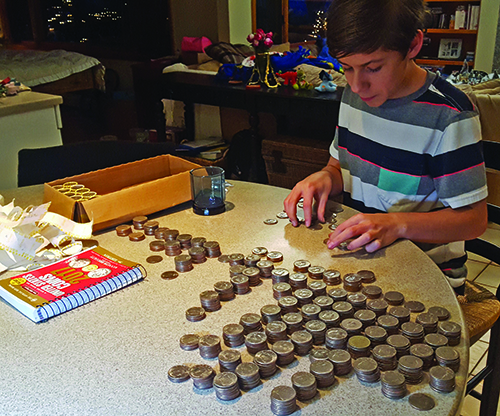
By Ray Levato
Cash is king. Or so our parents and grandparents thought. But now, with so many different ways to pay for things, one important question comes to mind: Is cash getting scarce in everyday commerce? And if so, what are the implications for today’s kids and coin collecting?
Kids who had a paper route back in the day always had a bunch of coins to sort through, and there was always change to go through after a trip to the store. But if the transaction is made with a debit card, or you scan and pay with a smart phone, there is no pocket change to sort. And with talk of eliminating the minting of the one-cent piece, and maybe even the nickel, the available pool of circulating coins could get even smaller.
New Generation of Collectors
But not to worry. Coin collecting seems to be alive and well among today’s youth. A lot of parents get their kids started with quarter boards and take advantage of the popularity of nearly 20 years of the United States Mint’s successful 50 State Quarters program and America the Beautiful quarter designs.
And some kids discover a love of coin collecting from a box of old coins handed down from an aunt or uncle.
To get an idea of the state of kids and coin collecting, I asked the adult advisor to the Rochester (N.Y.) Junior Numismatic Association. Joe Lanzafame got his start in coin collecting by looking at penny rolls with his grandfather in the 1970s. “Kids have a much lower excitement threshold when it comes to coins,” says Lanzafame, meaning that even a coin flattened on a railroad track can be fun.
The Rochester Numismatic Association marked its 100th anniversary in 2012 and is one of the oldest continually meeting coin clubs in America. Among its members, and a past president, was famed collector John Pay Pittman, who amassed an important collection of coins on a modest salary as a chemical engineer for Eastman Kodak Co., in Rochester. (The Pittman collection was sold in three auctions in the late 1990s for over $30 million!)
Check out this video produced by the Stafford High School Spartan Coin Club about the impact of the ANA’s Coin’s for A program…
Finding Treasures in Coinstars
The junior organization got its start in 1947. The youngest member is 6 and the oldest 14. Andrew Ophardt, 14, says, “I found an 1893 Indian cent in a Coinstar reject slot. It was so different than anything I had seen that I got interested.”
Andrew says he continues to stick his hand in every Coinstar reject slot, and has also searched through hundreds of coin rolls that his dad brings home from the bank. Together, they started with cents and worked their way up to half dollars.
Andrew has found dozens of wheat cents, silver war nickels, and even some 40% silver halves—along with some oddball stuff like the occasional proof and foreign coin. Says Andrew, “Most of my collection comes from those searches, and it all started with that one 1893 Indian cent!”
Andrew’s father acknowledges the power of that one little coin. “As a young teen, I remember eagerly getting every issue of COINage,” Andy Ophardt says. “However, in my twenties to forties, my coin collecting interest went dormant. Then, when Andrew found the Indian Head cent and wanted to know more about coins, it rekindled my interest in coins, as well. It’s been a great father-son activity for us.”
Programs Support Youthful Collecting Endeavors
Lanzafame says some kids are also interested in foreign coins. “You’d be surprised how a box of junk world coins can create a lot of excitement. There might not be a lot of collector value in these coins but they generate a lot of interest for kids.” Kids also show an interest in internet shopping and auction sites like eBay.
And kids don’t have to rely on their parents’ pocket change. The American Numismatic Association (ANA) has a number of programs aimed at today’s youth, including Coins for A’s.
According to the ANA’s website, if students earn three or more A’s on a school report card, and the ANA will send them a free coin, along with a free initial one-year electronic membership. The organization is based in Colorado Springs, Colorado, and encourages home-schooled students to participate, as well.
The ANA also encourages coin clubs in schools. Rod Gillis, ANA’s Education Director, says, “[B]ecause we’re an educational institution, we want to promote academic excellence and doing well in school. And kids will prize a coin more if they earned it.”
Collecting in Light of Coinless Trends
Gillis acknowledges it’s an uphill battle because coin collecting doesn’t offer the instant gratification of video games and smart phones, but he says, “the future of the hobby lies with the kids.” Gillis says Coins for A’s averages two to three new kids every day, and now has about 1,500 participants nationwide.
The United States Mint also features a number of kid-oriented coin-collecting programs under the banner “History In Your Pocket” (H.I.P.).
Another aspect of the growing coinless trend was related in a USA Today MONEY article by Brett Molina, entitled “How do we teach kids about money when we ditch cash?” The premise: Kids’ interest in money usually starts with the Tooth Fairy, but will the Tooth Fairy someday pay in something other than cash? (See Numismatic Nostalgia, January 2016.) And without coins and dollars to hold and save, how do kids learn about the value of money?
Speaking of the Tooth Fairy, we have an update. According to a Delta Dental poll of 1,588 parents with kids age 6 to 12, the Tooth Fairy is now paying an average of $4.66 for each missing tooth—up from $3.91 in 2015. A big upgrade from the dime or quarter under the pillow when I was a kid!
Columnist: Ray Levato
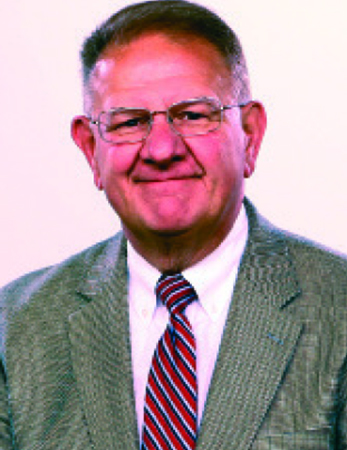 A retired television newscaster, he started collecting Lincoln cents at age 7 in 1955.
A retired television newscaster, he started collecting Lincoln cents at age 7 in 1955.
He has a lifelong fascination with the hobby’s rich history.


